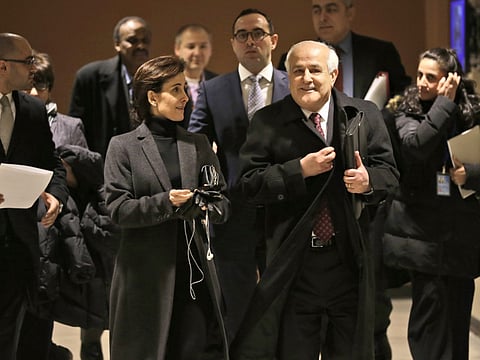Arabs endorse UN draft to end Israeli occupation
Palestinian proposal pushes for a peace deal within a year and an end to colony-building

United Nations: Arab UN delegations on Monday endorsed a Palestinian proposal to forge a peace deal with Israel within a year and end Israeli occupation of Palestinian territories by late 2017, despite fierce Israeli and US opposition.
The timing for a UN vote on a measure that faces almost certain defeat is unclear.
Several Western council diplomats told Reuters they had been surprised by the Palestinians’ sudden push to submit a final draft resolution to the United Nations Security Council on Monday and put it to a vote on Tuesday or Wednesday.
Jordanian UN ambassador Dina Kawar, the sole Arab representative on the council, told reporters all 22 Arab delegations endorsed the Palestinian proposal, and the Jordanians and Palestinians would consult immediately on “the best time to cast the vote in the Security Council.”
When asked if the vote could be delayed until next year, she said, “Everything is possible.” Dina previously said she would like a resolution that was backed by all 15 council members including the United States.
A US State Department spokesperson said the Palestinian draft resolution was not constructive and failed to address Israel’s security needs.
Nine Security Council votes are needed to adopt a resolution, which would then force the United States, Israel’s closest ally, to decide whether to veto it. Washington would be expected to vote against it, diplomats say.
Israel has said a Security Council vote, following the collapse in April of US-brokered talks on Palestinian statehood, would deepen the conflict. It supports negotiations but rejects third-party timelines.
Several European countries have urged a less stringent timeline to win broader support. Washington wants to wait until after Israeli elections in March.
The Palestinian draft resolution, obtained by Reuters, calls for negotiations to be based on territorial lines that existed before Israel occupied the West Bank, East Jerusalem and the Gaza Strip in the 1967 Middle East war.
It also calls for resolving all major differences, known as “final-status issues,” within 12 months, ending the occupation by the end of 2017, and establishing a “third-party presence” to help oversee Israel’s withdrawal and guarantee Palestinian sovereignty.
Israel, which pulled troops out of the Gaza Strip in 2005, says its eastern border would be indefensible if it withdrew completely from the West Bank.
An earlier Palestinian draft called for occupied Jerusalem to be the shared capital of Israel and a Palestinian state.
The final proposal reverts to a harder line, saying only that occupied East Jerusalem will be Palestine’s capital and calling for an end to Israeli colony-building and the release of Palestinian prisoners.
Sign up for the Daily Briefing
Get the latest news and updates straight to your inbox



